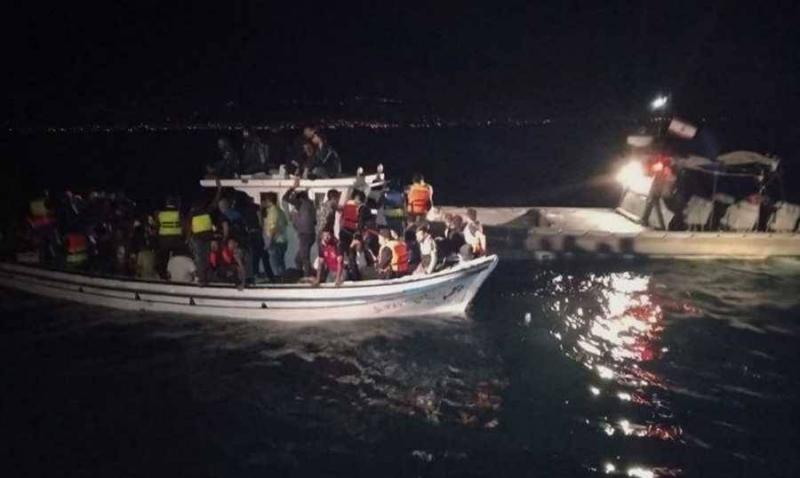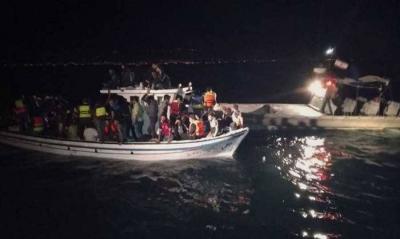Irregular migration no longer relies on fishing boats; it has become a lucrative trade for dozens, earning them hundreds of thousands of dollars. This trade is based on organized gangs that exploit the high demand for clandestine migration to amass enormous wealth. The leader of these gangs is often the one who records the highest number of "successful" boats that manage to smuggle people across the sea, which increases their standing in the human trafficking market and attracts more migrants, subsequently allowing them to raise prices due to high demand.
**Payment in Fresh Dollars**
Ahmad, 65, openly discusses his entry into this world, as his well-known home in the alleys of Bebnine, Akkar, has become a daily destination for dozens seeking to travel by sea. "Travel that doesn't require identification papers, no passport or visa. All you need to secure here is the dollar," Ahmad tells "Al-Akhbar." He previously worked in fishing and owned three fishing boats. In early 2017, a Syrian family of four contacted him, requesting to be transported to Cyprus. He charged $500 per person, totaling $2,000 for the trip, which represented months of income. He decided to turn to this profession to help these migrants achieve their dreams.
Daily, Ahmad receives dozens requesting to be placed on the first trip to Italy, Cyprus, or Greece. The demand is high, and bookings are now required. He sets the cost at $5,000 per person, often rising to $10,000 "if someone wants to migrate quickly or if they are wanted by the authorities." The customer pays half the amount initially, and the second half before the boat departs. The smugglers' duty is to secure the boat until it reaches the territorial waters, which requires two things: choosing a departure point and ensuring a safe arrival at the shore while transporting all necessary equipment for departure and escaping security oversight by diverting attention to a typically fictitious departure point.
**The Preparations for the Journey**
In 2014, a report from the International Labour Organization estimated worldwide human trafficking profits at about $150 billion annually, with the majority derived from sexual exploitation for commercial purposes ($99 billion) and around $51 billion from economic exploitation. In Akkar, boat owners accumulate profits of approximately $450,000 for each trip. Ahmad reveals the "arrangements for the trip": "An agreement is made with those seeking migration for a specific day, without revealing the departure point for fear that the security forces might catch wind of it and thwart the attempt. Based on promises made to the migrant, the boat is not supposed to exceed 20 people, only to surprise them on arrival at the chosen location with numbers often exceeding 80.” Despite this, those willing to migrate accept the risk: "There’s no room for objection—either you leave or you stay here," says Ahmad.
Regarding the distribution of money, sources indicate that it covers trip expenses, including fuel and boat preparations, plus amounts for individuals assisting in launching the trip. "Sometimes we have to pay bribes to facilitate the sailing process. The remaining amount is usually taken by the boat owner, who is always the gang leader."
**Exploitation and Fraud**
Despite the amounts paid by those wanting to migrate potentially providing a decent foundation for a better life if they put in the same effort in their homeland, the "dream" of riches remains more appealing. Mahmoud, a father of four, decided to migrate to Italy. He contacted a smuggler, who requested $25,000 for five individuals. Mahmoud sold his furniture and car, borrowed extra money, and paid $13,000 as an initial deposit, committing to pay the rest before the boat's departure. His luck ran out when security forces arrested the gang leader. He attempted to recover his money, contacting dozens but only managing to retrieve part of it.
Mahmoud's story is not an exception in Akkar, where incidents of fraud targeting irregular migrants, especially Syrians, are common. One migrant recounts how a smuggler handed them over to security forces: "He tried to transport us at night in an open pickup truck. We were about 80 people, along with large quantities of diesel and some personal belongings, heading towards the Al-Arida point. There, a security patrol intercepted us, stopped us, and seized the pickup and its contents. We’ve not yet recovered even one dollar." Another recounts how someone took them to the port area in Tripoli—collecting a second payment of $2,000 after previously obtaining $2,000—and left after speaking with the boat owner, revealing they had arranged a leisure trip... to Rabbit Island!
**Pursuit by Security Forces**
Security sources emphasize their ongoing efforts to combat irregular migration and prevent migrants from falling into the clutches of gangs. "If these individuals are not defrauded by smuggling gangs, they are often transported in dilapidated boats that can't even cover a kilometer. If those migrants we apprehend daily were left unchecked, we would hear of hundreds of boats sinking." The security source continues: "We often need days of surveillance to apprehend those responsible for smuggling rings, but laws only keep them in prison for one month at most before they return to their activities." Regarding victims' exposure to fraud and deceit, they point to the possibility of lodging complaints at security centers to recover their money and rights.




